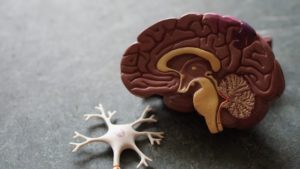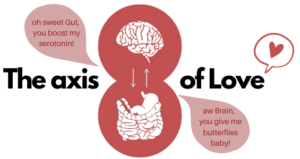The Brain-Gut Axis
The Brain-Gut axis is the term used to describe the dynamic and intimate communication network between the brain and the gut.
Simply put, the Brain-Gut axis is the connection between the brain and the gut.
Information is constantly being delivered to the brain from the gut and the brain interprets this information and sends messages back to the gut. If the brain isn’t happy, the gut isn’t happy (and vice versa).
The communication between the brain and the gut is heavily reliant on the vagus nerve!
The vagus sends messages to the gut while also relaying messages about the gut environment to the brain. The vagus nerve communicates with the GI tract through the enteric nervous system, which is the gut’s exclusive nervous system.
Brain and Gut Connection
Knowing that the Brain-Gut axis is the connection between the brain and the gut and are in regular conversation explains many sensations we take for granted.
A common example of how your mental state influences gut function and vice versa is when you’ve experienced ‘butterflies in your stomach’, or felt nervous and nauseous before an event.
You might have felt your mouth water upon seeing or smelling a delicious meal.
These are all very real examples associated with your brain-gut connection.
On the other hand, feeling under pressure or stress can also decrease your digestive function.
This is because when your body-mind perceives ‘danger’, then eating is not a priority.
This means digestion suffers and you may experience symptoms like bloating, heartburn, or some other uncomfortable symptoms.
Knowing the existence of this brain-gut link can help explain how feeling anxious may impact how your gut is functioning, but perhaps more significantly (though not as well known) is that what’s going on in your gut could also be impacting your mental health.
Lighting a Fire in the Brain
Though there may be many causes, a key player in this situation is gut-derived inflammation.
This can result from dysbiosis, which is an imbalance in your gut microbiome (the gut bacteria that lives within your intestines), and/or some degree of damage to the digestive tract lining – your gut ‘barrier’ causing leaky gut.
Both your gut barrier and bacteria work together to support effective digestion, immune health, and overall wellbeing.
However, if they become disrupted then inflammatory biochemical signals or ‘cytokines’ are released that travel throughout your body. This causes what’s referred to as oxidative stress in the tissues of your body including your brain.
Though many of these inflammatory mediators cannot cross what’s called the blood-brain barrier, their presence triggers similar ‘alarm’ signals in the brain so it too is impacted by its own inflammatory processes.
This sequence of events can be why symptoms such as poor mood, brain fog, and anxiety occur.
To give us a further understanding, let’s look at:
Brain gut connection and Serotonin.
Gut bacteria also produce hundreds of neurochemicals that the brain uses to regulate basic physiological processes as well as mental processes such as learning, memory, and mood.
For example, gut bacteria manufacture about 95 percent of the body’s supply of serotonin, which influences both mood and GI activity.
Inflammation can cause a reduction in serotonin production. You see, with inflammation, the neurotransmitter (brain chemical) precursor tryptophan will produce quinolinic acid, instead of serotonin and melatonin.
Quinolinic acid leads to what can most simply be described as nerve cell ‘agitation’ that can present as anxiety.

Find a solution to your gut problems to Settle Your Mind
As gut health is fundamental to all aspects of wellbeing, any related symptoms really need to be attended to.
To do that with the least guesswork, see a natural healthcare practitioner Your Wellness Centre who can help you find out what may be the contributing causes for you.
For example, you might need to speak to our naturopath, who can help you
- Tweak your diet?
- Get some help with digesting certain foods?
- Heal your gut lining?
- Check why you are struggling with stress, sleep,
- Reduce experiencing regular mood problems
You see, there are many natural medicine solutions available. To find the best ones for you, you will require assessing your personal history and current circumstances first.

Is it too Early to Rely on Psychobiotics?
If you are already a fan of natural medicine you may be wondering what the role of probiotics is in this, particularly as there is emerging talk of ‘psychobiotics’ or probiotics that can impact mood.
This is clearly of interest to those who may be experiencing stress or anxiety, and many research developments are taking place as we speak. If you would like to read more about currently available pieces of evidence of ideal probiotic strains for moods, it is discussed here.
Overall, supporting our whole gut health by decreasing gut-derived inflammation and improving the amount and balance of the gut microbiome, is a proven clinical approach to whole-body wellbeing – and this includes improving mental health.
If you are experiencing symptoms impacting either your mind or your gut, please don’t put up with them any longer, or try to figure it all out on your own.
Contact Your Wellness Centre naturopaths or ring on 9879 9596 and let them know what’s going on, so they can personalize a treatment plan suitable for you!





Leave a Reply
Want to join the discussion?Feel free to contribute!